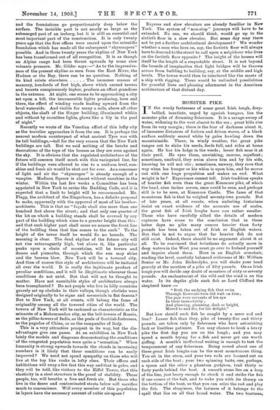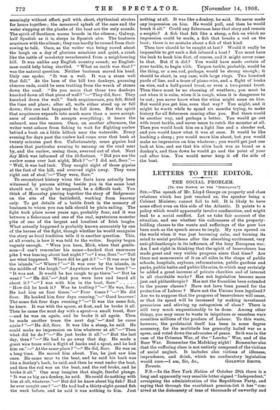MONSTER PIKE.
IN the weedy fastnesses of some great Irish lough, deep- bellied, insatiate, urged by ogreish hungers, lies the monster pike of dreaming fishermen. It is a savage sweep of water, widening to the west almost to the sea ; great hills rise
from its very margin; there is the fear of darkness about it, of immense distances of forlorn and driven waves, of a black surface suddenly seared white by gales howling down the mountainside. There, in windy weather, the great pike ranges out to slake his needs, feeds full, and rides at home
again. He has his lodge in the weeds ; lesser fish near it at their peril. He eyes them, unwinking, morose, repellent; sometimes, unafraid, they swim above him and by his side, knowing he will not stir ; sometimes, unwary, they rove that
way when his hunger or his whim is upon him, and he moves out with one huge propulsion and makes an end. What weight is he ? Experience cannot tell. Irish tradition speaks of heavier fish even than the great Kenmure pike, of which the bead, nine inches across, once could be seen, and perhaps still is to be seen, at Kenmure Castle. The fame of that monstrous fish is that he weighed seventy-two pounds. But of late years, at all events, when unfeeling historians insist on exact evidence of the accurate use of scales, the great fish of Irish loughs have run rather smaller.
Those who have carefully sifted the details of modern captures have come to the conclusion that in these latter days no pike many ounces heavier than forty pounds has been taken out of Irish or English waters.
But that is not to argue that far heavier fish do not still exist. Indeed, there should be no argument about it at all. To be convinced that leviathans do actually move in deep waters in the West you must go over to Ireland yourself and inquire about them. Here in an English armchair, reading the level, carefully balanced criticisms of Mr. William Senior or Mr. John Bickerdyke, you will shake your head gravely at the mention of a pike of fifty pounds. On an Irish lough you will deride any doubt of monsters of sixty or seventy pounds.. An enchantment of the wild and the wind is on the water. In its depths glide such fish as Lord Clifford the shepherd knew :—
" Both the undying fish that swim Through Bowscale-tarn did wait on him ; The pair were servants of his eye. In their immortality ;
And glancing, gleaming, dark or bright, Moved to and fro, for his delight."
But how should such fish be caught by a mere rod and line ?• Leaser fish than they, pike of twenty-five and thirty pounds, are taken only by fishermen who have astonishing luck or limitless patience. You may chance to hook a heavy pike the first day you are on the lough ; and you may spend a month trying for a fish and never get one worth gaffing. A month's ineffectual waiting is enough to test the temperament of any fisherman. Being rowed about one of these great Irish loughs can be the most monotonous thing. You sit in the stern, and your two rods are boomed out on each side of the boat ; your two' spinning baits, one, perhaps,
a spoon and the other a phantom gudgeon, trail thirty or forty yards behind the boat. A smooth stone Bee on a loop
of the line, just heavy enough to check it and strike the fish if one comes at the bait, and to wake you with its thump on
the bottom of the boat, so that you can seize the rod and play the fish. The sleepiness, the laziness of it belongs to the
spell that lies on all that broad water. The two boatmen,
seemingly without effort, pull with short, rhythmical strokes for hours together; the measured splash of the oars and the water slapping at the planks of the boat are the only sounds. The spirit of Southern noons broods in the silence ; Galway, half Spadish as it is, sleeps in Spanish airs. The boatmen acquiesce with the silence ; they can hardly be roused from their rowing to talk. Once, as the writer was being rowed about the lough on a day of glorious sunshine and quiet, a crash like the rattle of musketry reverberated from a neighbouring hill. It was unlike any English country sound; no English. man could help being startled. " What on earth was that ?" was the natural question. Neither boatman moved his bead. Only one spoke. "It was a wall. It was a stone wall that fell." At the base of the bill two donkeys, pursuing obscure ends, could be seen trotting from the wreck of stones down the road. " Do you mean that those two donkeys knocked down all that piece of wall? "—" They did, Sorr. They knocked down the wall." Such acquiescence, you felt, fitted the time and place; after all, walls either stood up or fell down; this one had happened to fall down. But the spirit that acquiesces expands into much more than a mere accept. ance of accidents. It accepts everything ; it hears the unheard, sees the unseen. Once, on another afternoon, the writer went ashore from fishing to wait for fighting curlew behind a bush on a little hillock near the waterside. Every evening for days past the curlew had come over that bush at twenty minutes past five. Unfortunately, some gipsies had chosen that particular evening to encamp on the road near by, and the curlew, seeing them, swerved out of shot. Next day Mick was informed of the ill-fortune. "Did you see the curlew come over last night, Mick ?"—" I did not, Sorr."- "Well, it was bad luck. They caught sight of those gipsies at the foot of the hill, and swerved right away. They were right out of shot."—" They were, Sorr."
To reconstruct history when the facts have actually been witnessed by persons sitting beside you in the same boat should not, it might be supposed, be a difficult task. You think of Macaulay piecing together the story of Sedgemoor on the site of the battlefield, working from hearsay only. To get details of a battle fresh in the memory of boatmen to whom you can talk should be plain sailing. The fight took place some years ago, probably four, and it was between a fisherman and one of the real, mysterious monster pike of one of the largest and loneliest of Irish loughs. What actually happened is probably known accurately by one of the heroes of the fight, though whether he would recognise the story as local tradition tells it is another question. This, at all events, is how it was told to the writer. Inquiry began vaguely enough. " Were you here, Mick, when that gentle- man—I can't remember his name—hooked that enormous pike I was hearing about last night ? "—" I was, Sorr."—" Tell me what happened. Where did he get it "—" It was over by the islands."—" Where ?"—" It was over by the islands, in the middle of the lough."—" Anywhere where I've been ?
"-
"It was not. It would be too rough to go there."—" But be went ? "—" He did."—" And you were here and beard all about it ? "—" I was with him in the boat, Sorr."
" How did he hook it ? Was he trolling ? "—" He was, Sorr He had him on four times."—" Four times ? "—" He did Sorr. He hooked him four days running."—" Good heavens ! The same fish four days running ? "—" It was the same fish,. he knew. It was with the spoon, at first, and he broke it all. Then he came the next day with a sprat—a small trout, Sorr —and he was on again, and he broke it all again. Then he made another trace the next day."—" And he came again ? "—" He did, Sorr. It was like a sheep, he said. He could make no impression on him whatever at alL"—" Then what did he do ? "—" He just broke it all."—" But the last day, then ? "—" He had to go away that day. He made a great wire trace with a flight of hooks and a sprat, and be bad him on."—" At the same place ? "—" He did, Sorr. He was on a long time. He moved him about. Yes, he just saw him once. He came near to the boat, and he said his back was like a donkey's back, he said, and then he went under the boat, and then the rod was on the boat, and the rod broke, and he broke it all." One may imagine that single, fearful plunge. " It was as big as a donkey, he said. He could do nothing with him at all, whatever."—" But did he know about big fish ? Had he ever caught one ? "—" He had had a thirty-eight-pound fish the week before, and he said it was nothing to him. Just
nothing at all. It was like a donkey, he said. He never made. any impression on him. He would pull, and then be would break it all." Could any fisherman hear that story and remain a sceptic ? A fish that felt like a sheep, a fish on which no impression could be made, a fish that breaks a rod on the boat ; there is no mistake about a fish of that kind.
Then how should he be caught at last ? Would it really be impossible to get such a fish inboard a boat ? You must have the luck to book him first, of course, and it might never come to that. But if it did ? You would have made certain of your tackle, to begin with. Tarpon tackle, probably, would be the thing, or a sea rod, perhaps, would be strong enough ; it should be short, in any case, with large rings. Two hundred yards of line, and a trace of piano-wire, and a flight of hooks on wire, and a half-pound trout, or even a two-pound trout. Then there must be no choosing of weathers ; you must be out when it is calm, when it is rough, when it is dangerous to be out; you never know when the whim might come on him. But would you get him, even that way ? You might, and it might be worth while to spend six months trying, to make history for all fishermen coming after you. But there would be another way, and perhaps a better. You would go out with trout tackle, and never mean to catch the monster at all. Then you would hook him on a light line and a slender rod, and you would know what it was at once. It would be like hooking a sheep ; you would move him about, but you would make no impression on him whatever ; you would get just one look at him, and see that his olive back was as broad as a donkey's, and then down be would go and the point of your rod after him. You would never keep it off the side of the boat.











































 Previous page
Previous page